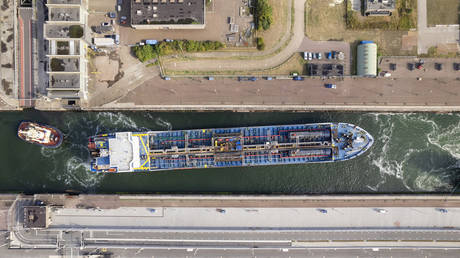
IMF warns Europe over energy security
The conflict between Moscow and Kiev is keeping energy prices high, a study released by the International Monetary Fund suggests
The Ukraine conflict and sanctions on Russia could harm energy security and economic development throughout Western and central Europe, analysts from the International Monetary Fund (IMF) have warned. The findings come as the EU considers restrictions on liquefied natural gas (LNG) imports from Russia.
Despite the “impressive array” of actions taken by policymakers to strengthen energy security since the outbreak of the hostilities and the trade restrictions on Moscow, energy costs remain high, according to the study conducted for the IMF and published on Tuesday.
By Europe, the document refers to the European Union, the United Kingdom, Iceland, Liechtenstein, Norway, and Switzerland.
Simulations carried out by the report’s authors suggest that the Ukraine crisis and resulting measures against Russia will have “mixed effects” on energy in the medium term.
Read more
EU states ‘surprised’ by Russia’s economic resilience – Reuters
Reducing energy dependence on Moscow by diversifying supplies may have left the continent better-prepared for a future energy supply shock, the paper suggests. The EU has increased fuel purchases from the US and Africa, and is also working to boost its own energy production.
However, despite an increase in energy supply sources and some reduction in consumption, prices remain higher than they would have been in a no-conflict scenario, the paper states.
The hostilities “could persistently increase energy prices in Europe, which would weaken energy security by raising the energy spending share in GDP and thereby making economic activity more sensitive to any energy disruptions,” the document reads.
In 2022, Europe suffered its worst energy crisis since the 1970s, triggered by sanctions on Russia. Electricity prices jumped from €45 to €598 per megawatt hour in August of that year. The EU phased out use of Russian coal and imposed an embargo on seaborne oil from the country, reducing imports by 90%. Meanwhile, Russia’s share in EU gas imports fell from 41% in 2021 to 15% in 2023. The EU has set itself a goal of phasing out all remaining Russian fossil fuel imports by 2030.
Moscow, however, has emerged as a leading supplier of liquefied natural gas (LNG) to the bloc, accounting for 16% of its imports last year. The EU is currently considering an import ban on Russian LNG as part of a 14th set of restrictions.
READ MORE: EU state could veto new Russia sanctions – Politico
The proposed measures would prevent EU countries from re-exporting Russian LNG, but would fall short of an outright ban.
Moscow has said any restrictions against Russian LNG – along with efforts to “squeeze” the country out of energy markets – will only lead to higher gas prices for EU consumers.
Since the launch of the massive Western sanctions campaign in 2022, Moscow has redirected most of its energy exports to Asia, primarily to China and India.
For more stories on economy & finance visit RT’s business section


